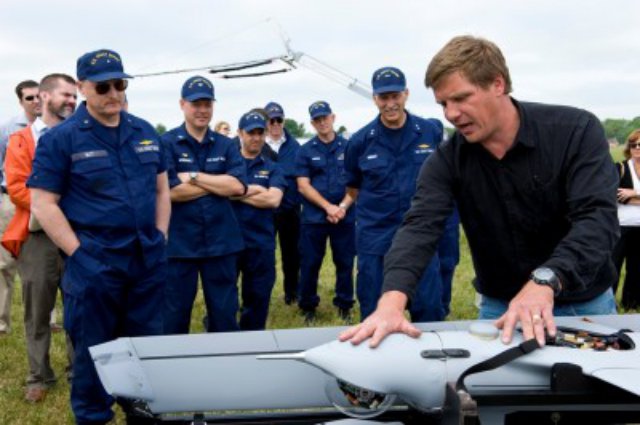 US Navy engineers demonstrated the intelligence, surveillance and reconnaissance (ISR) capabilities of a ship-based UAS for senior Coast Guard, Navy and Congressional stakeholders in an exercise on the Potomac River.
US Navy engineers demonstrated the intelligence, surveillance and reconnaissance (ISR) capabilities of a ship-based UAS for senior Coast Guard, Navy and Congressional stakeholders in an exercise on the Potomac River.
Naval Surface Warfare Center Dahlgren Division (NSWCDD) personnel launched the ScanEagle UAS on simulated search and seizure missions, successfully detecting and engaging fictional insurgents under the watchful eyes of several Coast Guard senior leaders.
“The demonstration proved our capability to remotely engage hostile threats from a Coast Guard cutter with unmanned systems and persistent surveillance,” said NSWCDD Commander Capt. Michael Smith. “This unmanned aircraft system – developed as a result of collaboration with our military and industry partners – will greatly impact the Coast Guard’s most challenging maritime security, law enforcement and national defence missions.”
Military and civilian officials from Naval Air Systems Command, Naval Sea Systems Command, and industry in addition to a Senate Armed Services Committee staff member joined Coast Guard officers on the NSWCDD Potomac River Test Range to see firsthand the capabilities of the ScanEagle UAS scheduled to deploy this summer aboard one of the Coast Guard’s National Security Cutters (NSC).
“A small UAS like the ScanEagle represents an interim solution to meet a surveillance range extension capability requirement for the NSC,” said Michael Tangora, the Coast Guard’s Deputy Chief Acquisition Officer, who was on hand for the event. “The Coast Guard Research and Development Center has been working with NSWC Dahlgren and the Scan Eagle will give us a good look at what it can do as a technology demonstration on an NSC.”
As the fictional scenario unfolded, the distinguished visitors observed two suspect vessels rapidly exchanging contraband in an apparently unmonitored river location. “The Scan Eagle monitored this exchange while tracking the assets until a U.S. Coast Guard craft could apprehend, board and search the insurgents’ craft and take suspects into custody,” said Nelson Mills, NSWCDD Capabilities Manager.
“At the scenario’s conclusion, they saw the successful recovery of the aircraft with the skyhook,” said Lorenz Eber, NSWCDD Unmanned Systems Operation and Safety Director. “Our visitors left with an excellent understanding of what a ScanEagle System can do if launched and operated from a ship.”
Coast Guard Assistant Commandant for Capability Rear Adm. Mark Butt – an interested observer at the demonstration – suggests that a small UAS like the ScanEagle could provide the Coast Guard with a cost-effective capability. “If we can solve the airspace issues, it looks like a really interesting way to improve some capability at a good price,” he said. “They have discussed its uses on the high seas, but it could also work well in a port setting.”
Meanwhile, a team of four NSWCDD Engagement System Department engineers and two Insitu contractors are planning to deploy for approximately two weeks this year aboard a National Security Cutter equipped with the Scan Eagle UAS.
Developed by Insitu Group, a subsidiary of Boeing, Inc. – the Scan Eagle UAS is a runway independent, long-endurance, unmanned aircraft system designed to provide multiple surveillance, reconnaissance data, and battlefield damage assessment missions. Integrated with a unique communications relay and optical day-night sensors for a complete battlefield picture, the Scan Eagle weighs 40 pounds. Its ten-foot wingspan lifts the four-foot long fuselage where the engine, avionics, GPS and a fully directional video camera are housed. Scan Eagle provides about 15 hours of continuous day or night surveillance at a height of about 19,500 feet.
Performing many of the Coast Guard missions, the National Security Cutters provide a presence in the Pacific Ocean near Central and South America to protect the United States from illegal drugs and associated transnational crime. NSCs will also patrol the Gulf of Alaska and Bering Sea to protect these fishing grounds from poachers, ensure compliance with U.S. fishing regulations and respond to mariners in distress.
NSWC Dahlgren Division’s broad spectrum of unique resources, including workforce, infrastructure, and relationships with industry, have made it a premier naval scientific and engineering institution dedicated to solving a diverse set of complex technical problems confronting the warfighter, whether on land, in the air, on the sea or in space.
Photo: Naval Surface Warfare Center Dahlgren Division engineer Lorenz Eber briefs the design and capabilities of the Insitu Scan Eagle
Photo by Public Affairs Specialist 1st Class Andy Kendrick
Source: South Maryland News
